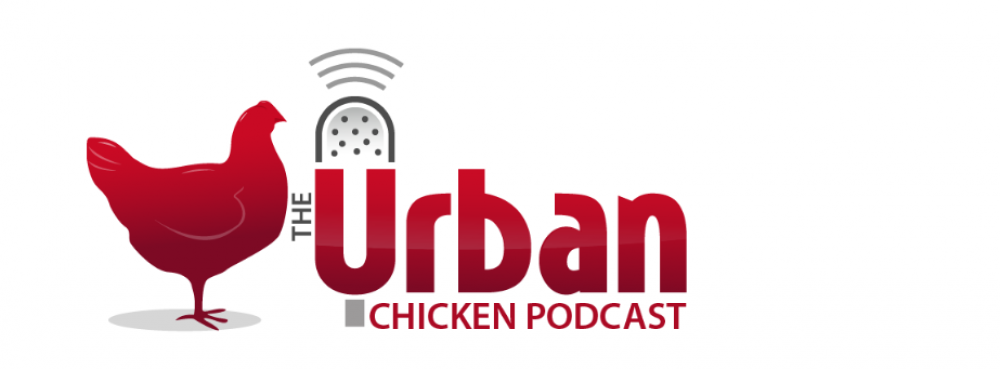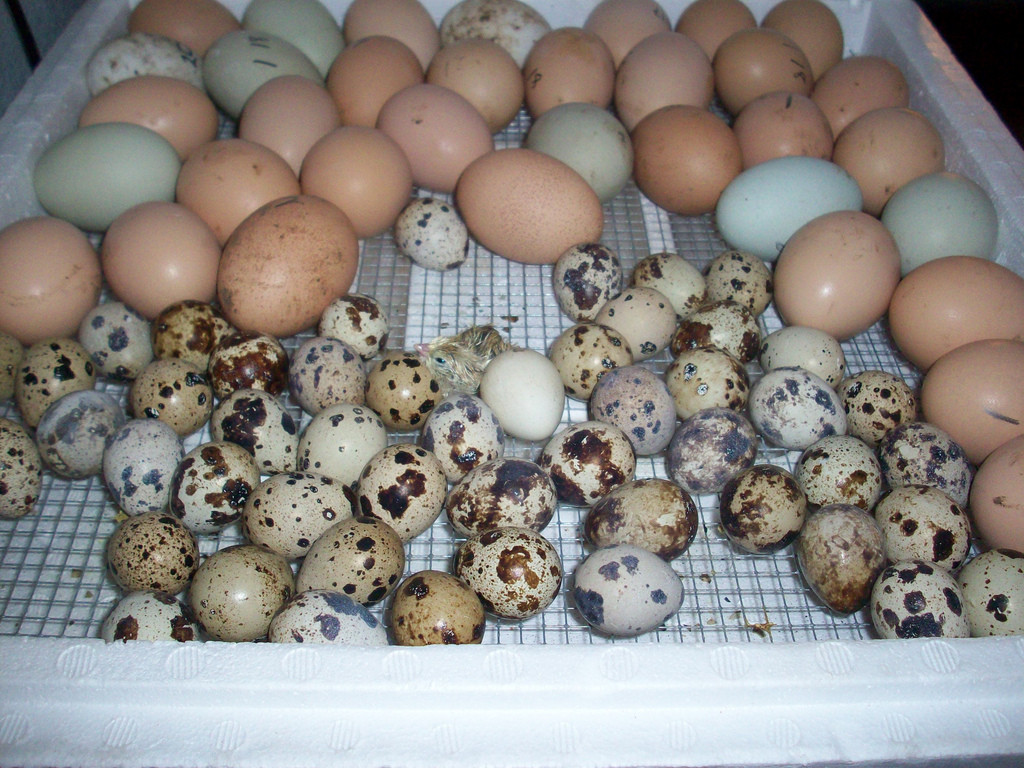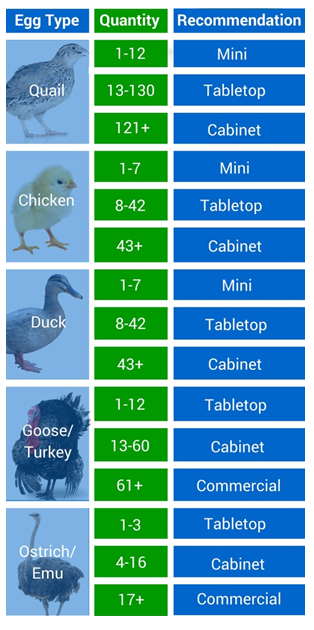Emily Baker is a flock owner of Ancona Ducks and the manger of Incubators.org. In this article, she shares her expertise knowledge of how to pick the right incubator for your hatching needs.
While there is still snow on the ground, it may be hard to believe that spring is just around the corner. Yet, if the groundhog is to be trusted, spring is only about a month away. For many of us, this marks the beginning of the most exciting time of year- hatching season!
Whether you are hatching chicks for profit or pleasure, you need the right tools to get the job done. While some breeders prefer to let Mother Nature do her thing, many enjoy the experience and control of hatching using an incubator. However, with so many options available on the market, it can be a bit intimidating to choose the ideal incubator for your hatching needs.
So how do you know which incubator is the right one for you?
FACTORS OF INCUBATOR SELECTION
When deciding which incubator to choose, there are 5 main considerations:
- Egg Type
- Egg Quantity
- Future Growth Plans
- Functionality Requirements
- Budget
The combination of these five factors will help to determine which incubator is right for you.
Egg Type & Egg Quantity
When consulting with breeders regarding incubator selection, the first questions I always ask are, “What type of eggs are you planning to incubate?” and “How many eggs do you plan to incubate at one time?” The answer to these questions gives me a clear picture of what they want to accomplish, and what size incubator will best suit their needs.
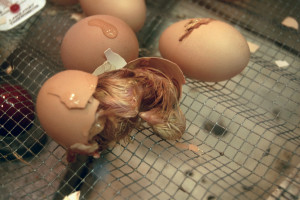
Hatching Egg 4 – by ~Pawsitive~Candie_N
There are four main categories of incubators: 1) Mini, 2) Tabletop, 3) Cabinet, and 4) Commercial. By identifying the type of eggs you are going to be incubating, and how many you plan to hatch, you can narrow the options of incubators down to the appropriate category of incubator for your needs.
Tabletop and cabinet style are the most common choices, mainly because of the size and
production growth potential for these incubators. Most small breeders will choose a tabletop model, as it has a broad capacity range, and takes up a relatively small amount of space to operate.
Future Growth Plans
There are two different ways to expand your incubation operation. You can either
purchase a large cabinet-style incubator, or purchase multiple tabletop incubators.
Many breeders find that although a tabletop model incubator would meet their current needs, they prefer to go ahead and purchase a cabinet incubator instead due to their desire to grow their business. They can still incubate a small number of eggs, and simply add more eggs as their operation grows.
Others prefer to purchase multiple tabletop incubators, as this gives them more versatility. They can incubate a variety of egg types at one time separately; it is the literal equivalent of not keeping all your eggs in one basket. Even if there is an incubator failure, your hatch will not be a total loss. However, the multiple tabletop incubator option does present its own challenges. It can be more difficult to manage multiple incubators, and may require a larger amount of space than a single cabinet incubator.
Functionality Level & Budget
The amount of functionality that you desire from an incubator will also factor into which incubator you should select. Some incubators have many integrated features that control the incubation process for you, whereas other models are little more than a hot box. The level of features typically corresponds with the price of the incubator.
Here is what you can expect from different price levels of incubators:
Incubators Priced Under $100 (US)
- Manual Controls (No Digital Display or Humidity Readout/Control)
- No Automatic Egg Turner Included
- Still Air (No Fan Included)
- Typically Styrofoam Construction
- Mini or Tabletop Models Only
Incubators Priced Between $100-$200 (US)
- Some Digital Controls
- Automatic Egg Turners Included
- Circulated Air (Fan Included)
- Mostly Styrofoam, Some Plastic Models
- Mini or Tabletop Models Only
Incubators Priced Between $200-$600 (US)
- Digital Controls
- Automatic Egg Turning
- High Level of Functionality – e.g. Automatic Humidity Systems, Hatch Timers, etc.
- Quality Construction Using Durable Plastics
- Tabletop Models Only
Incubators Priced Over $600 (US)
- Cabinet Models or High End Tabletop Models
- Automatic Turning Included
- Digital or Manual Controls (Digital Controls start at about $800)
- Some Humidity Display or Controls
- High Quality Construction
- Large Egg Capacity
INCUBATOR BRAND ANALYSIS
Of the popular incubator brands, GQF models tend to be less expensive, as they are made in the USA and do not have any import fees associated with them. They are typically long lasting, and it is easy to get support if something goes wrong with the unit. The GQF company offers a very basic mini model, several variations of tabletop models with a variety of features, and three different levels of cabinet model incubators.
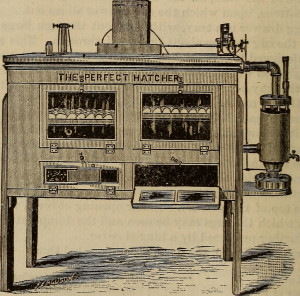
Incubator 1883 – Internet Archive Book Images
The ReptiPro 6000 is the only incubator model created by ReptiPro. It is an inexpensive incubator falling in the $150-$250 price range while offering a good number of features for the price. Included features in the ReptiPro 6000 are: digital temperature controls, insulated plastic housing, and a thermo-electric temperature control system.
Brinsea incubators are mid-range in price and quality. Though Brinsea incubators typically have a higher price point, this is commiserate with their durable construction and higher level of features. Brinsea incubators are manufactured in the United Kingdom, but have a U.S. branch that provides a good level of support for their products. The Brinsea company offers a range of mini, tabletop, and cabinet model incubators with varying levels of functionality.
R-Com incubators are typically the most expensive of the major brands. These incubators are manufactured in South Korea. Though R-Com incubators are high-end machines, it can be challenging to get support for here in the U.S. for this brand.
CLOSING THOUGHTS
When choosing an incubator, it all really comes down to three questions: 1) what type of eggs you want to incubate, 2) how many eggs you want to incubate now and in the future, and 3) how much money you are willing to spend. In the end, only you can make the choice of which incubator best suits your needs. Choose an incubator that is right for your skill level and budget, and purchase from a company that provides good support and assistance.
FINAL TIPS FOR SPRING READINESS
- Order your incubator as early as possible in the season. Shipping times get much longer as the hatching season goes on due to demand. By purchasing your incubator early you can make sure that you have everything that you need for your hatch and that the equipment is all working properly. There is nothing worse than setting up your incubator for your first hatch and realizing that it is damaged or not functioning correctly!
- Don’t forget the accessories. Pay attention to what is included with the incubator you select. If it does not have a humidity gauge built in, you will want to purchase a hygrometer separately. Does your egg type require specific trays for use in the incubator? If so, you will want to make sure you have these on hand before you are ready to incubate.
- It doesn’t end with incubation. Once your eggs have hatched, you will need to have a brooder ready for them to go into, and a plan for what to do with them once they are big enough to move outdoors. Are you planning to sell them as chicks, or raise them yourself? Having a solid plan will help you to be more efficient and better prepared to get a return on your investment.
Good Luck, and Happy Hatching!
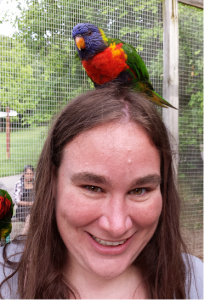 Emily Baker is the proud mother of 1 boy, 1 cat, 2 dogs, 3 turtles, and a flock of Ancona Ducks. She is the manager of Incubators.org, and has assisted thousands of breeders in finding the right incubator for their projects over the last decade. If you need further assistance in incubator selection, feel free to give her a call at (800) 259-9755. She will be happy to answer any questions you may have.
Emily Baker is the proud mother of 1 boy, 1 cat, 2 dogs, 3 turtles, and a flock of Ancona Ducks. She is the manager of Incubators.org, and has assisted thousands of breeders in finding the right incubator for their projects over the last decade. If you need further assistance in incubator selection, feel free to give her a call at (800) 259-9755. She will be happy to answer any questions you may have.
